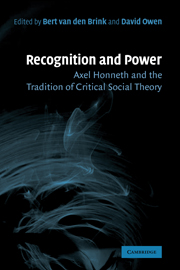Book contents
- Frontmatter
- Contents
- List of Figures and Tables
- Contributors
- Acknowledgments
- 1 Introduction
- PART I PHILOSOPHICAL APPROACHES TO RECOGNITION
- PART II RECOGNITION AND POWER IN SOCIAL THEORY
- PART III RECOGNITION AND POWER IN POLITICAL THEORY
- 9 “To Tolerate Means to Insult”: Toleration, Recognition, and Emancipation
- 10 Misrecognition, Power, and Democracy
- 11 Reasonable Deliberation, Constructive Power, and the Struggle for Recognition
- 12 Self-Government and ‘Democracy as Reflexive Co-operation’: Reflections on Honneth's social and Political Ideal
- PART IV AXEL HONNETH ON RECOGNITION AND POWER
- Bibliography
- Index
12 - Self-Government and ‘Democracy as Reflexive Co-operation’: Reflections on Honneth's social and Political Ideal
Published online by Cambridge University Press: 24 July 2009
- Frontmatter
- Contents
- List of Figures and Tables
- Contributors
- Acknowledgments
- 1 Introduction
- PART I PHILOSOPHICAL APPROACHES TO RECOGNITION
- PART II RECOGNITION AND POWER IN SOCIAL THEORY
- PART III RECOGNITION AND POWER IN POLITICAL THEORY
- 9 “To Tolerate Means to Insult”: Toleration, Recognition, and Emancipation
- 10 Misrecognition, Power, and Democracy
- 11 Reasonable Deliberation, Constructive Power, and the Struggle for Recognition
- 12 Self-Government and ‘Democracy as Reflexive Co-operation’: Reflections on Honneth's social and Political Ideal
- PART IV AXEL HONNETH ON RECOGNITION AND POWER
- Bibliography
- Index
Summary
This chapter approaches the political significance of Honneth's theory of recognition by way of his articulation of an ideal of (radical) democracy as reflexive co-operation drawn, in large part, from the work of Dewey. The opening two sections of the chapter sketch the main features of this ideal and its apparent advantages with respect to competing proceduralist and republican ideals. It then proceeds to demonstrate the relationship between this ideal and the formal ethical account of the good that Honneth proposes in The Struggle for Recognition, before turning critically to evaluate the naturalistic moral psychology and theory of recognition that underpins Honneth's articulation of this ideal. The chapter concludes by drawing attention to a number of problems that this account identifies with Honneth's research project.
Honneth's argument for ‘democracy as reflexive co-operation’ is articulated by way of the claim that Dewey's mature democratic theory combines two elements: (1) a theory of human socialization that links self-realization to membership of a community of co-operation, and (2) an epistemological argument for democracy that emphasizes the rational value of democratic procedures for problem-solving. Let us address each in turn.
Honneth glosses Dewey's theory of human socialization thus:
From their completely open drives, which at first consist of nothing other than a multitude of undirected and thus formable impulses, human beings can develop only those capabilities and needs as stable habits of action which have met the approval and esteem of their particular reference group; the satisfaction that a subject has in realizing certain action impulses increases to the degree to which it can be sure of the recognition of its partners in interaction. […]
- Type
- Chapter
- Information
- Recognition and PowerAxel Honneth and the Tradition of Critical Social Theory, pp. 290 - 320Publisher: Cambridge University PressPrint publication year: 2007
- 1
- Cited by

